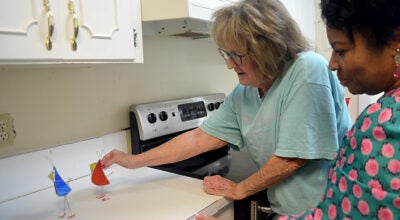Council still weighing increases
Published 12:00 am Thursday, October 8, 2009
With an important part of the city of Brundidge’s budget still waiting to be decided, city council members are weighing the pros and cons of utility rate increases.
Council member Lawrence Bowden, who represents District 1 said he really hasn’t decided how he’ll vote.
“It’s a matter of budgeting. We do have to do it. It has to be done. It’s a matter of it we want to break it gently or whether we want to do it all at one time,” Bowden said.
However, Bowden said the city would have to structure its budget to reflect whatever decision it makes.
“I can’t say exactly how I’m going to vote. My feelings right now are I would like to not do it all at one time because it would be a hardship on people,” said District 4 council member Cynthia Pearson.
District 5 council member Steven Coleman would not comment on how he plans to vote.
“I don’t care to comment on (the increases) because we are still working to get everything right,” Coleman said.
The decision comes from two rate studies the city had conducted of its electric system and water and sewer systems to help bring them both up to par financially.
The city hired two engineers to conduct rate studies on electric and sewer and water systems and both engineers presented their plans during the Sept. 2 council meeting.
Each engineer presented what he believed would put the city on track to have self-sufficient utilities.
St. John Engineer’s conducted the electric rate study and proposed the city raise the monthly minimum charge from $7.50 a month to $24 per month.
A minimum charge is the amount a customer pays whether electricity is used or not.
If the council chooses to implement this charge, the city would only collect the necessary cost to supply power rather than under collecting from some customers and over collecting from others.
In Brundidge’s case, the actual cost of power would decrease from at little more than 12 cents per kilowatt-hour to 10 cents per kilowatt-hour.
But regardless what the council decides about electric rates, residents are already seeing the effects of a 6.5 mil wholesale power decrease, which was passed down to the city from PowerSouth Energy Cooperative, the city’s wholesale power supplier.
Currently, Brundidge charges $135.68 tax and all for 1,000-kilowatt hours of electricity.
This can be broken down into a $7.50 base fee per residential account, 6 cents per kilowatt-hour, a $62.96 fuel adjustment cost and a 4 percent utility tax.
Under the proposed plan, Brundidge would charge a base fee of $24, 8.5 cents per kilowatt-hour, a $15 fuel adjustment cost and the 4 percent utility tax for a total of $128.96 tax and all.
While, customers would see savings in power costs, the council will need to increase costs in the sewer and water departments.
City Engineer Max Mobley told the council it really doesn’t have a choice in raising its sewer rates because the city must remain in compliance with EPA regulations concerning the allocation of sewer system operating and maintenance costs.
Mobley’s proposal includes an increase for a standard meter service from $8.60 per month to $10.74 a month.
Mobley also proposed a nearly $5 increase in the monthly minimum water rate but said it was necessary for the city to place the water system on a financially self-sufficient basis.
Currently it costs $8.65 for a standard meter, $8.27 for water and $ 21.32 for sewer, per 5,300 gallons, for a total of $38.24, which is the average resident’s usage.
Under Mobley’s plan, it would cost $13.41 for a standard meter, $12.77 for water and $26.73 for sewer, for a total of $52.72 for 5,300 gallons.
Since this would increase significantly, the council asked Mobley to show them how it would affect customers if the city implemented the rate changes over the course of two to three years.
For example, a customer who uses 1,660-kilowatt hours and 4,000 gallons of water and sewer, currently pays $265.26, but would only pay $245.34 for the first year.
By comparison if the council was to vote to implement the entire rate structure as the engineers suggested originally, the same customer would pay $263.18.
“I’m sort of inclined to think it would be easier on our residents to spread it out over a three year span,” Bowden said.
“There are pros and cons. The electric decrease is coming to everyone because our supplier has passed it down to us.”
Until the council votes on the utility rates, no budget will be passed for the 2010 fiscal year, which began Oct. 1.
“We’re still looking at it. Whatever I vote is what I feel is best for the citizens of Brundidge and for the governing part,” Pearson said.
“We need to take care of our citizens and our city.”
Other members of the council were unavailable for comment.





